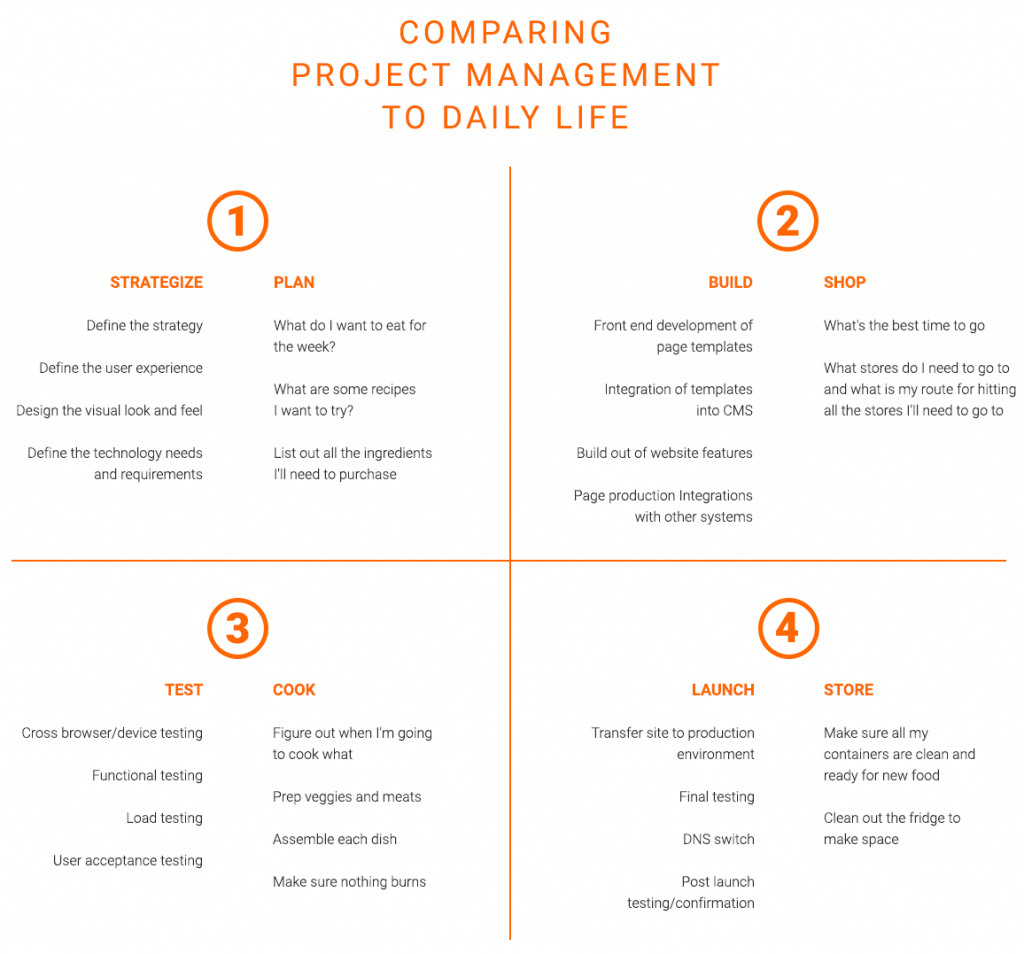Posted on 3/10/2018 in UX and Design
By Corey Furdon
I have to be honest with you: I have yet to come across anyone over the course of my career that “wanted” to be a project manager. Including myself. I didn’t go to college “for project management”, I didn’t graduate college with the dream of becoming a project manager. It just sort of happened. But, sticking with the honesty theme, it may be one of the best things that’s ever happened to me. Being a project manager has taught me skills that not only make me better at my job, but carry through to my everyday life and, at least I hope, make me better at life.
Below we’ll explore three skills embodied by good project managers, and how these skills might be applied to life outside of the office.
1. Making lists and checking them off
One of the most basic yet essential skills a successful project manager must possess is the ability to list out all of the work that needs to be done, often all the way down to the nitty-gritty details. With website redesign projects, we typically start by defining the broad milestones of the project. At the very highest level, it might look something like the list below where I compare the project management of a website redesign to the “real world”.

We could keep breaking each section further, all the way down to the most minute task of setting up and adding Google Tag Manager to the master page template. But you get the point. While you may not know all of the details at the onset of the project, it’s helpful to start with broad strokes and continue to refine the tasks as they are uncovered.
If you’re like me and prepare a week’s worth of food on the weekend, this list-making skill is essential. I know in order to have a successful food prep session I must mirror the process from above. This list could be broken out all the way down to “remember to bring the usable grocery bags to the store”. While it may seem common sense to make a list, it often saves me from waking up on Sunday morning with only a jar of pickles to prepare for the week. Similar to how having this list defined at the onset of your project will hopefully prevent you from reaching your launch date with a half-cooked website.
2. Creative Scheduling
In the world of project management, your schedule is your lifeline. It informs everyone – from you, your team, your boss, to the client – of what is getting done when and by whom. A well-planned schedule is derived from the detailed list you made above, with each task given a length of time for completion based on time estimates provided by your team. Plus padding, of course. Always include padding for the unknown and unknowable! This is the easy, and obvious part of scheduling.
The next level of schedule development is identifying and planning for the dependencies amongst the tasks you have to complete. For instance, design files have to be finalized before you can begin front-end development. Front-end development has to be completed before you can integrate the templates into the CMS. And the site has to be built before you can QA it!
The real creativity comes into play when you’re faced with obstacles, such as a key resource on the project not being available for a significant period of time. Or client delays on approvals or feedback on items that need to be completed before moving to the next phase. Or my personal favorite, a sudden “must be live by” launch date introduced in the middle of the project. All of these obstacles can throw a huge monkey wrench into a meticulously planned out scheduled if you let it.
How can you navigate through these challenges and still stay on track?
Look to bring in additional resources
If your budget can sustain it, you might consider adding additional resources, either to augment your current resource plan, or to cover for a current resource that will not be available for a period of time. It is important to understand how this additional resource will impact your overall budget, so be sure to keep that in mind when exploring this option.
Split work into separate tracks
It can be frustrating when your entire timeline is getting thrown off course because of one single bottleneck. Instead of just pushing out all of the dependent tasks, look for ways that your team can continue making progress. For example, if you and the client are still finalizing the details of the functional pieces on the site, but the designs are approved, you might consider moving forward with breaking out the designs into HTML/CSS pages if the frontend of the site is not dependent on the functionality you’re working to finalize. Another example is if you’re coming up on a deadline to start QA, but you only have content for half of the site. You could formalize a plan for the QA team to focus their initial efforts on the completed pages first, buying the team time to wrap up the remaining pages.
There are many other ways to mitigate scheduling conflicts, but we’ll save that for another post!
How has learning to be a creative scheduler changed my life outside of work? Well, have you ever tried to be in three places at once during the holidays? Or really just any weekend in general? It’s no secret that our lives seem to be busier and busier, and creative scheduling comes in extremely handy often. Taking cues from my Project Management skills, when faced with scheduling challenges in my life, I first look at what’s ahead of me and prioritize. What do I have to do and of that, what has to happen first before anything else can be done? Once you identify what the actual blockers are, you can figure out how to work around them. So if you know you absolutely have to be at Grandma’s by noon on Christmas day, you can schedule in time to visit your friends and your parents around that.
Another thing I do is identify what on my list of “things I have to get done” can happen in the background while I’m doing other things. Practical, every-day applications of this might be putting in a load of laundry and then heading out to walk the dog or grocery shop. The laundry gets done in the background while you focus on the tasks that need your actual attention. Now, if they could only invent a machine to fold and put away the laundry…
3. Motivating a team to deliver
I believe that the most “unsung hero” of all project management skills is also the hardest to quantify and measure, and that is motivating your team. As a project manager, there have been many times where I’ve found myself frustrated that I can’t actually help my team do the actual work. I’m not a designer or a developer, so it can be difficult to push people to do the work when you’re not really producing an actual deliverable yourself. However, even though I don’t have the capability to work side by side with my team and help bug fix the latest code release or crank out designs, I can still be in the trenches with them in other ways. For example, I might work with project managers on other projects to free up my team from those obligations, if at all possible. Or if my team is staying late, I will stay late with them, even if I’m only there for moral support, or to fetch them food. I make sure my team feels supported and recognized, in whatever way possible, even when I’m pushing them to meet a deadline. And perhaps most importantly, reminding the team of the goal – the ultimate purpose for why we are doing what we are doing – can help drive your team move forward. The ultimate goal can sometimes get lost in the everyday grind of a project.
Motivating a team to deliver, in real life, is a lot like being a good friend. If your friend is going through a difficult time in their life, you might not be able to actually physically help them with their struggle, but you can support them in many other ways. Sometimes just being there, whether physically or not, is enough motivation to help someone through a trying situation. Like a project manager does with their team, a good friend, spouse, parent, or coach, reminds the people around them of the ultimate goal – whether it’s to finish the project, win the game, or to simply enjoy life. Everyone needs a cheerleader now and again!
Although project management wasn’t one of my early life’s goals, it has given me a rewarding career. Good project management skills provide a framework for getting projects done efficiently in the office, just like they can outside of the office in everyday life. Being organized and task-oriented can help keep you be efficient and productive, ultimately allowing you to run the day versus it running you…and not leaving you with only that jar of pickles!
Ready to start a new project?
Contact us to help define the scope and goals of your upcoming website or digital marketing project. We'll make sure you are set up for success!
Related Articles

Outdated or Outstanding? How to Tell If Your Website Needs a Refresh
Your website is the digital face of your business. It serves as a first impression, a marketing tool, and a resource for potential customers. [...]

Preparing a Website Redesign Budget for 2025: A Step-by-Step Guide
As we approach 2025, businesses are recognizing the necessity of a fresh, user-friendly website to stay competitive in a rapidly evolving digital [...]

Elevating Your Brand: The Transformative Power of Website Design
In the digital age, your website is often the first point of contact between your brand and potential customers. It's not just a platform to showcase [...]

